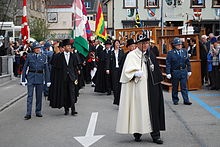Weibel (official)


Weibel (also Amtweibel, French huissier, Italian usciere, Romansh salter ) is a Swiss official designation.
Today's functions
A woman serves the government, parliament or the court. He is responsible for duty and errands, acts as usher and has ceremonial duties.
A distinction is made between different women:
Federal level
-
Confederate women are active in the service of all three federal powers, namely as:
- Federal Council women are permanently assigned to a Federal Council .
- Parliamentary women are assigned to either the National Council or the Council of States .
- Federal Court Weibel are for the Federal Court in Lausanne , the Federal Criminal Court in Bellinzona and the Federal Insurance Court in Lucerne operates.
Cantonal level
- Professional women (also state or country women ) work for the government and (rarely: or) the cantonal parliament .
- Council women are the official servants of the cantonal parliaments of Basel-Stadt, Glarus and Solothurn.
- Court servants ( court servants) are the official servants of a court (term only used in a few cantons).
Municipal level
- Stadtweibel or council women work for larger cities and primarily have ceremonial tasks. Correspondingly , the community woman who runs errands for the community administration and also has formal tasks.
At public appearances, the Weibel wears a gown in the colors of the body represented. Federal women, for example, therefore wear a cape that is half red and half white. Under this gown and during normal duty in the government or parliament building, the federal woman wears a green uniform, which is shaped like a tailcoat for federal women women.
When appearing in gowns, one can distinguish between Federal Council and Parliament women by the fact that the former wear gold edging and a gold medal with the Swiss coat of arms, while the latter wear their silver counterpart.
history
In the Old Confederation , the Weibel was a subordinate official of an authority or rule and performed a variety of tasks in administration and in the judiciary. For details see the articles mentioned under literature as well as the official offer .
Word origin
The word Weibel comes from Old High German weibil , which in turn is derived from Ahd. Weibôn , 'to move back and forth'. The rank designations Feldweibel (Switzerland) and sergeant (Germany) are of the same origin, as is common in Swiss German and Swiss High German verb (around) weibeln , busily walking around ', campaigning socialize', lobbying drive '.
See also
- Ban warden
- Lictor , a comparable ceremonial function in ancient Rome
literature
- André Holenstein: Weibel. In: Historical Lexicon of Switzerland .
- Weibel in the Swiss Idiotikon .
- Anne-Marie Dubler : The Freiweibel in Oberaargau. Locals in the Bernese regional administration. In: Anne-Marie Dubler: Formation of the state and administration based on the model of Bern. here + now, Baden 2013 (archive of the Historical Association of the Canton of Bern 90), pp. 347–370.
- Hubert Foerster: The Grossweibel in Freiburg 1803-1848. In: Freiburger Geschichtsblätter 80, 2003, pp. 91-109.

